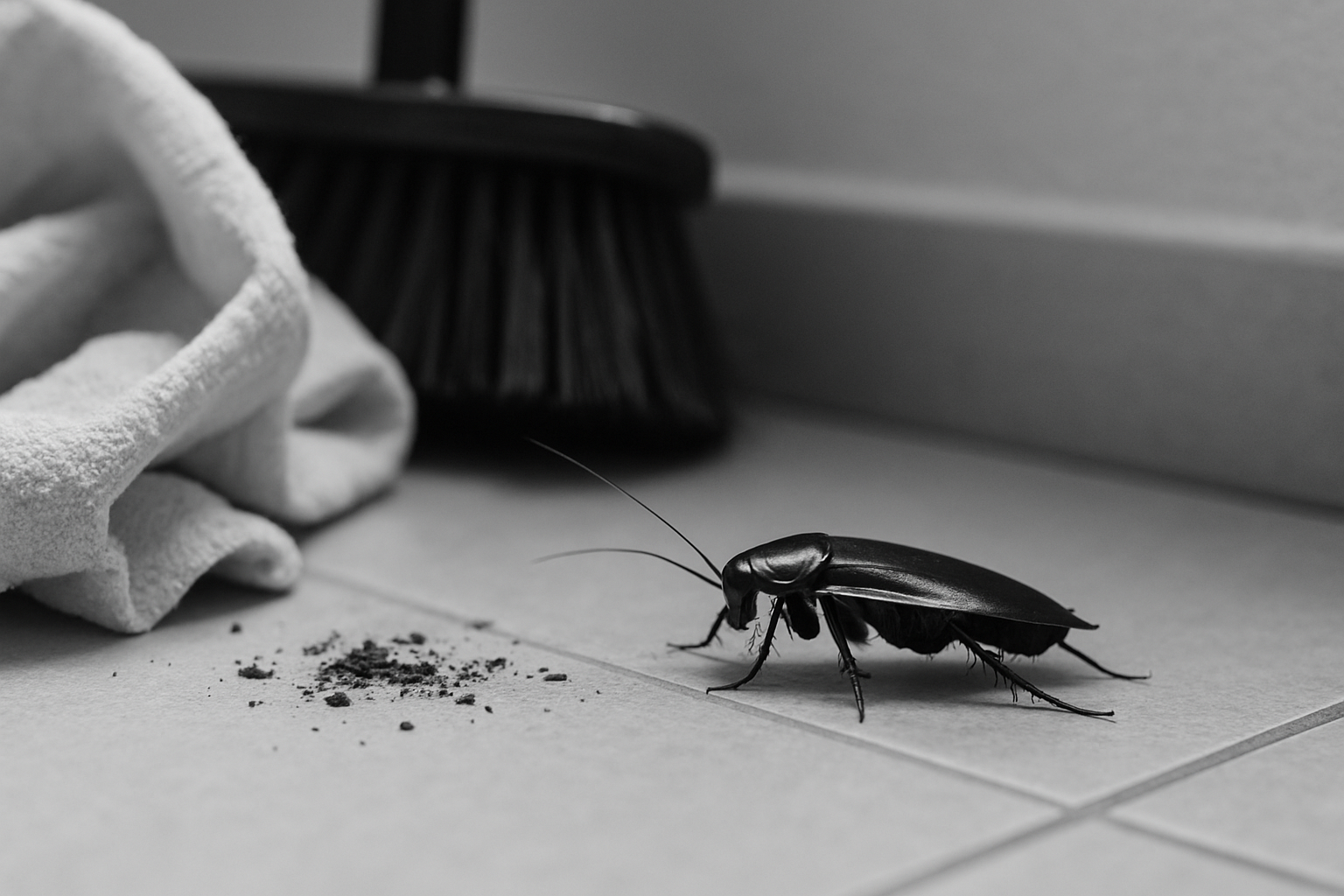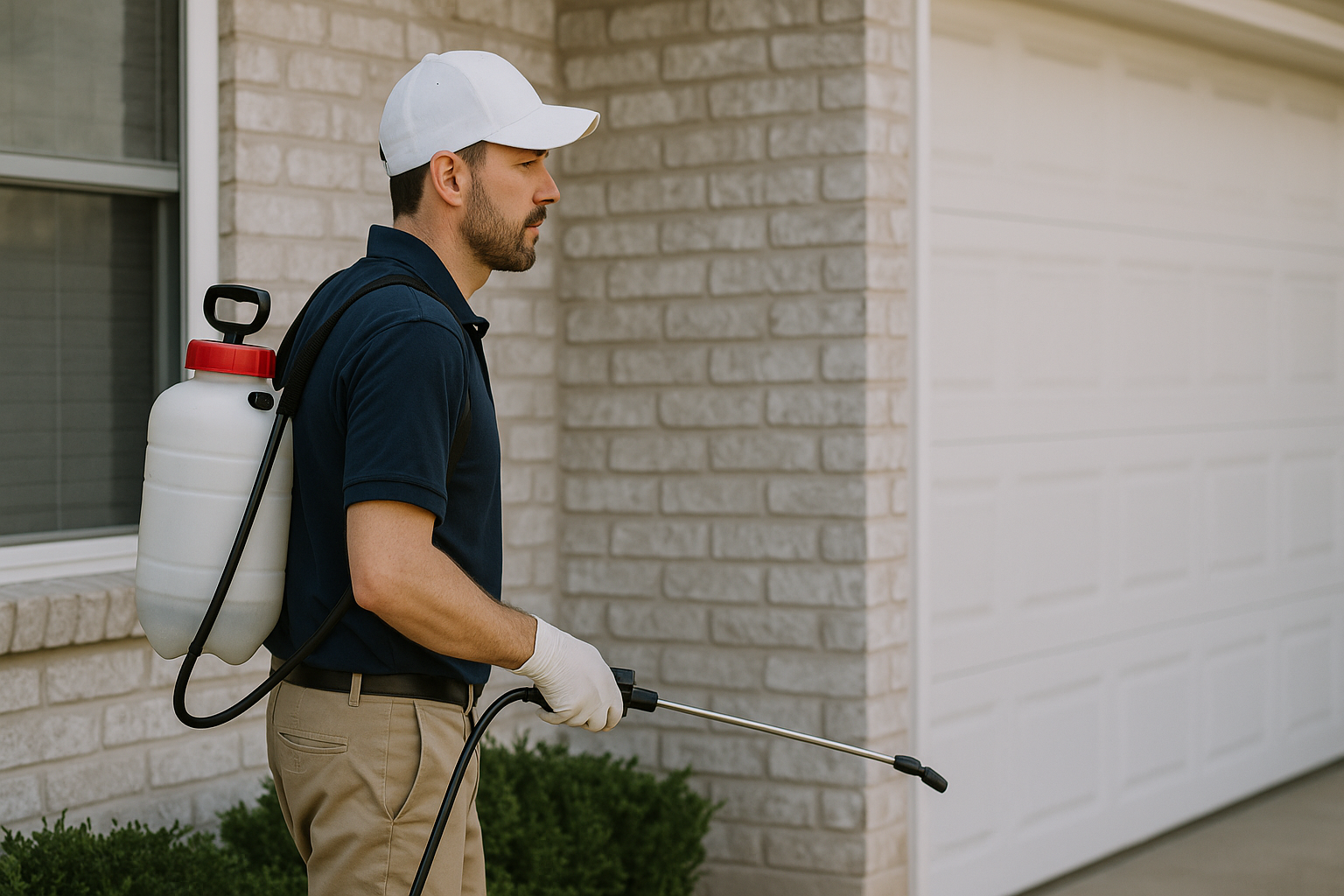Table of Contents
Checklist for Cockroach Control
Cockroach infestations not only pose health risks but also create significant discomfort for residents and businesses in Dubai. The key to maintaining a roach-free environment hinges on thorough cockroach sanitation practices paired with preventive measures. This comprehensive checklist outlines essential areas to address for optimal cockroach management.
Effective cockroach sanitation and control involves four critical steps: sealing entry points, fixing leaks, decluttering spaces, and storing food correctly. Each of these must be meticulously handled to break the cockroach lifecycle and minimize conducive conditions for their survival.
Seal Gaps and Cracks
Cockroaches use tiny gaps around doors, windows, pipes, and walls to infiltrate homes and commercial spaces. Sealing these entry points is one of the most proactive methods to prevent infestations in Dubai’s residential and business areas such as Business Bay and Arabian Ranches. Consistent sealing not only blocks entry but also supports ongoing cockroach sanitation in Dubai homes and businesses.
Inspecting usual access points includes:
- Baseboards and molding edges
- Spaces between kitchen cabinets and walls
- Cracked tiles or grout joints
- Utility penetrations (pipes, wiring cables)
- Window frames and door thresholds
Use high-quality sealants suitable for humid Dubai climates to close these gaps effectively. Maintaining these seals over time is crucial, especially due to wear from heat and dust common in areas like Dubai Marina.
Fix Leaks and Control Moisture
Cockroaches are attracted to moisture sources which supply them with water for survival. Dubai’s climate and modern building infrastructure can sometimes foster hidden leaks or condensation spots that create ideal environments for cockroaches.
This cockroach sanitation step includes:
- Regular plumbing inspections for dripping taps and pipe seepage
- Addressing condensation on surfaces in bathrooms and kitchens
- Ensuring proper drainage around building foundations, especially in older Downtown Dubai properties
- Using dehumidifiers or improving ventilation to reduce humidity
Promptly repairing leaks not only discourages cockroaches but also prevents mold growth, enhancing indoor air quality in Dubai’s residential and commercial premises.
Declutter to Reduce Hiding Spots
Cockroaches thrive in cluttered environments where they find shelter. Reducing clutter in living and working spaces diminishes their ability to hide and breed undetected. Decluttering is a fundamental part of cockroach sanitation in Dubai, reducing hiding spaces that sustain infestations.
Key decluttering practices include:
- Removing piles of newspapers, cardboard boxes, and unused items in storage rooms
- Keeping kitchen counters and floor spaces clean and free of food crumbs
- Organizing cables and equipment neatly in electronic stores or offices around Nad Al Sheba
- Regularly disposing of trash and recycling materials to avoid accumulation
Implementing these habits is vital for Dubai residents and businesses to maintain a clean environment unfavorable to cockroach activity.
Proper Food Storage Techniques
Food availability is a major attractant for cockroaches. In Dubai’s diverse culinary and retail scene, strict food storage protocols are necessary to combat infestation.
Best practices for food storage as part of cockroach sanitation include:
- Using airtight containers made of glass or heavy-duty plastic for dry goods and leftovers
- Refrigerating perishables promptly and securely
- Cleaning food spills immediately on floors and shelves in kitchens and supermarkets
- Avoiding open food storage overnight or during non-operational hours
- Regular inspection of stored food for spoilage or pest contamination
Dubai restaurants, cafes, and households benefit immensely from maintaining rigorous food storage standards to reduce cockroach attraction and growth.
Conclusion: Effective Cockroach Management in Dubai
Implementing these five essential cockroach sanitation practices—starting from a detailed sanitation checklist, sealing entry points, fixing leaks, decluttering, and proper food storage—will dramatically reduce cockroach presence in Dubai properties. By establishing disciplined hygiene routines and maintaining your premises, both residents and business owners in areas like Dubai Marina and Business Bay can create healthier, pest-free environments.
For professional guidance tailored to Dubai’s unique climate and urban landscape, consider consulting specialists such as Saniex Dubai for effective cockroach control. Additionally, staying informed on local regulations and health standards via the Dubai Municipality guidance on pest control supports ongoing compliance and public safety.
Take action today by starting your cockroach sanitation checklist and securing your Dubai, UAE property against infestations.
Enhancing Hygiene for Effective Cockroach Management in Dubai
Cockroach sanitation and control are critical components of any comprehensive pest management strategy, especially in urban areas like Dubai where high-density residential and commercial buildings provide ample habitat for cockroach infestations. Successful cockroach management hinges not just on chemical treatments or physical removal but equally—if not more so—on maintaining an environment that discourages their presence. This means prioritizing sanitation standards consistent with Dubai Municipality regulations and public health guidelines from Dubai Health Authority (DHA) to ensure sustainable pest prevention.
Understanding the role of sanitation in cockroach control involves acknowledging how these resilient pests survive and thrive. Cockroaches are attracted to food residues, moisture, clutter, and unhygienic conditions, all common in densely populated areas within Dubai’s localities like Business Bay, Dubai Marina, and Arabian Ranches. Therefore, integrating effective hygiene practices into daily routines is essential to minimize infestation risks and protect public health.
Key Sanitation Practices to Prevent Cockroach Infestations
Implementing rigorous sanitation measures is the first line of defense in cockroach control. These hygiene practices focus primarily on eliminating access to food, water, and shelter that attract these pests. For sustained management, buildings and households in Dubai should adopt these core practices:
- Proper Food Storage: Store food in airtight containers to prevent cockroach access. In Dubai’s culinary establishments and homes throughout Nad Al Sheba and Downtown Dubai, sealing leftovers and regularly cleaning kitchen surfaces helps break cockroach food chains.
- Routine Cleaning Schedule: Regular sweeping, mopping, and wiping of floors and countertops remove food particles and grease that attract cockroaches. Dubai’s hospitality industry often follows DHA guidelines emphasizing strict kitchen hygiene standards which significantly reduce pest risks.
- Waste Management: Securely covering garbage bins, removing trash daily, and sanitizing waste areas are crucial. Dubai Municipality’s waste disposal rules mandate frequent cleaning and proper segregation—practices that help curb infestation sources around residential areas like Medos and commercial zones like Business Bay.
- Moisture Control: Cockroaches need water to survive. Repairing leaks, ensuring dry sinks, and using dehumidifiers in humid areas minimize moisture. Dubai’s hot climate can create hidden moisture zones, especially in basements and utility rooms, so regular inspections are necessary.
- Decluttering and Sealing Entry Points: Removing cardboard, paper, and clutter denies cockroaches shelter. Additionally, sealing cracks around walls, cabinets, and pipes following Dubai Health & Safety Code standards eliminates entryways that cockroaches exploit.
In Dubai specifically, adherence to these practices aligns with the requirements of local health inspections and certification processes often mandated by Dubai Economic Department (DED) for food-related businesses. This ensures that pest prevention through sanitation is integrated within the broader health and safety compliance framework.
Sanitation Challenges Unique to Dubai’s Urban Environment
Dubai’s rapid urbanization, combined with its hot and humid climate, creates a unique environment where cockroach management must be more strategic. High-rise apartments in areas such as Dubai Marina and densely packed commercial kitchens in Business Bay present logistical challenges for routine cleaning, making it easier for pests to hide and reproduce unchecked. Moreover, transient populations and frequent hospitality turnover necessitate continuous education and training on sanitation best practices.
Further complicating sanitation efforts is the prevalence of shared utilities and waste disposal systems in many developments. Improper waste management in communal spaces can quickly lead to widespread cockroach issues, putting multiple residents or businesses at risk simultaneously. Therefore, Dubai’s property management companies often coordinate with pest control operators like Saniex to implement building-wide sanitation audits and treatments, enhancing the effectiveness of sanitation protocols.
The Dubai Municipality enforces stringent guidelines for commercial and residential pest control, including requirements for maintaining cleanliness to prevent cockroach infestations. Non-compliance can result in penalties and closure orders—an incentive for Dubai businesses and building managers to prioritize robust hygiene practices as part of their operational hygiene strategy. These factors highlight why cockroach sanitation in Dubai must be a community and management priority.
Integrating Hygiene Practices with Professional Cockroach Control
While sanitation significantly reduces the possibility of cockroach infestations, it is rarely sufficient on its own—particularly for established infestations. Professional pest control companies operating in Dubai, such as Saniex, emphasize a dual approach combining sanitation with targeted treatment methods. This synergistic approach maximizes long-term success and sustainability.
Here’s how cockroach sanitation integrates with professional services:
- Inspection and Assessment: Pest control experts assess sanitation weaknesses—identifying moisture leaks, clutter hotspots, and food residue areas contributing to infestation persistence.
- Customized Sanitation Plans: Based on inspection, customized sanitation recommendations align with Dubai Municipality standards to address site-specific conditions, whether in a high-end residential unit in Arabian Ranches or a commercial kitchen in Medos.
- Continuous Monitoring and Hygiene Coaching: Post-treatment, pest management companies provide hygiene coaching for staff and residents, ensuring adherence to sanitation protocols that support control efforts.
- Follow-Up Services: Scheduled follow-ups verify sanitation improvements, allowing adjustments to prevent recrudescence in alignment with DHA pest control guidelines.
This integrated approach not only addresses the current infestation but reduces reliance on pesticides, supporting Dubai’s vision for sustainable, eco-friendly pest management documented by regulatory bodies like the Dubai Health Authority. It also encourages responsible environmental practices within Dubai communities and commercial venues.
Public Health Implications of Cockroach Control in Dubai
Beyond nuisance factors, cockroach infestations carry substantial public health risks. Cockroaches are known vectors for bacteria, viruses, and allergens, contributing to respiratory problems such as asthma and triggering allergic reactions—a significant concern in Dubai’s densely populated neighborhoods like Downtown Dubai and Nad Al Sheba.
By maintaining high standards of cleanliness and hygiene, residences and businesses play an essential part in safeguarding community health. The Dubai Municipality, through its Food Control Department, mandates sanitation compliance to prevent foodborne illnesses linked to cockroach contamination in eateries and markets. Similarly, schools and healthcare facilities in Dubai are required to uphold rigorous sanitation protocols under DHA regulations to protect vulnerable populations.
Consequently, effective cockroach control transcends pest management—it’s a fundamental public health measure. This has led Dubai authorities to integrate sanitation-related pest control criteria into licensing, inspection, and certification processes for food establishments, hospitality venues, and residential buildings, reinforcing the importance of this practice citywide. Strong cockroach sanitation practices in Dubai directly support public health protection.
Community Engagement and Education for Sustainable Cockroach Management
Lasting success in comprehensive cockroach sanitation and management in Dubai depends heavily on community participation and awareness.
Local campaigns supported by Dubai Municipality and DHA often highlight simple, actionable sanitation steps residents and businesses can take. These include routine kitchen cleanliness, proper waste handling, and proactive leak repairs, all essential to reducing cockroach harborages. Workshops and digital resources provided by pest control professionals such as Saniex further empower Dubai residents by offering practical guidance.
In residential complexes, encouraging active involvement of property managers and homeowners’ associations ensures centralized coordination of sanitation efforts, mitigating common area infestation risks. Dubai communities, especially in high-density localities like Dubai Marina and Business Bay, have seen improvements in pest control outcomes where sanitation education is prioritized alongside professional interventions.
Conclusion
In summary, Cockroach Sanitation in Dubai is a cornerstone of effective pest management in Dubai’s unique urban and climatic context. Implementing comprehensive sanitation practices aligned with Dubai Municipality and DHA guidelines reduces cockroach attractants and breeding sites, thereby minimizing infestation risks. Challenges posed by climate, building design, and population dynamics demand a strategic, integrated sanitation approach fully incorporated into professional pest control services.
For Dubai residents and businesses alike, prioritizing sanitation is not merely a compliance requirement but a proactive measure to protect health, improve quality of life, and preserve the city’s reputation for cleanliness and sustainability. As pest control continues evolving toward environmentally responsible methods, effective hygiene remains foundational—ensuring that pest populations remain controlled through preventative measures, community education, and cooperative management.





